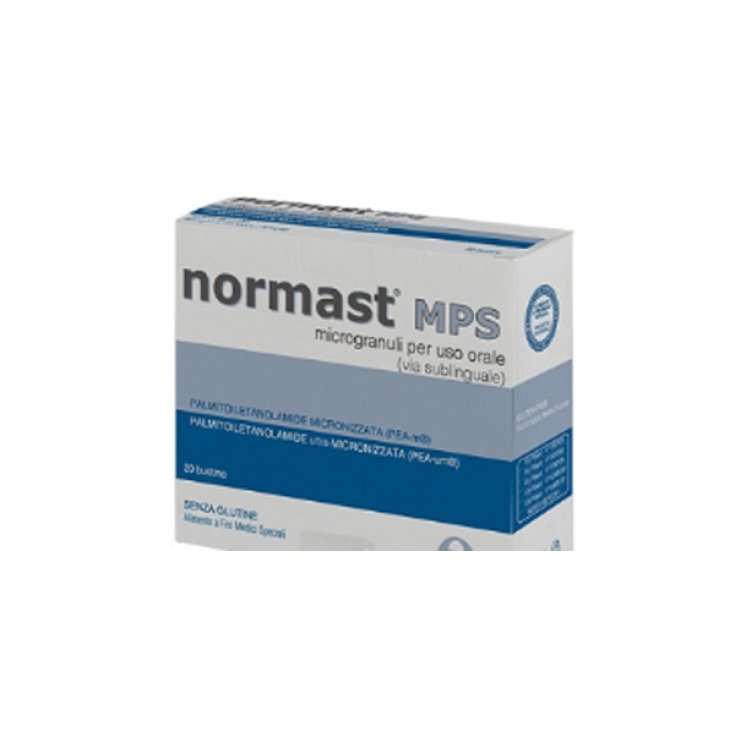Epitech Normast MPS Microgranules For Oral Use Sublingual Food Supplement 20 Sachets

- Brand: EPITECH GROUP SpA
- Product Code: 970521252
- EAN: 8031359080148
- Availability: In Stock
- Purchase 3 items for 29.58€ each
- Purchase 4 items for 28.97€ each
- Purchase 5 items for 28.37€ each
Epitech
Normast MPS
Microgranules For Oral Use Sublingually; Dietary supplement; 20 sachets
MICRONIZED PALMITOILETHANOLAMIDE (PEA-m)
Ultra-MICRONIZED PALMITOILETHANOLAMIDE (PEA-um)
GLUTEN FREE
Food for Special Medical Purposes
1) NAME OF THE PRODUCT
normast MPS (Food for Special Medical Purposes - AFMS)
2) QUALI-QUANTITATIVE COMPOSITION
2.1) Active ingredient:
normast MPS microgranules: micronized palmitoylethanolamide (PEA-m: particle size 2.0 ÷ 10.0 µm) 300 mg + ultra-micronized palmitoylethanolamide (PEA-um: particle size 0.8 ÷ 6.0 µm) 600 mg per sachet.
2.2) Excipients: each sachet of normast MPS microgranules contains 337.5 mg of a mixture of excipients (for the full list see section 7.1).
3) SHAPE OF THE PRODUCT
normast MPS microgranules: white granulate.
4) CLINICAL INFORMATION
4.1) Indications: Palmitoylethanolamide is a nutritional factor that acts as a biological factor in the body, favoring the control of physiological tissue reactivity. It is therefore to be used under medical supervision, for the diet of subjects with disorders sustained by neuroinflammatory processes. In such subjects it is useful to physiologically counteract the endogenous production deficit of Palmitoylethanolamide, which is determined when the organism, subjected to recurrent inflammatory conditions, exhausts its natural synthesis capacity. normast MPS is to be used under medical supervision, for the diet of subjects with disorders sustained by neuroinflammatory processes.
4.2) Dosage and method of use: on medical indication, as a guideline: normast MPS microgranules 1-2 sachets per day to be placed directly under the tongue, letting the microgranules dissolve with saliva.
4.3) Contraindications: none.
4.4) Warnings and precautions for use: the product is not suitable as a sole source of nourishment. Keep out of the reach of children under 3 years of age.
4.5) Interactions: not highlighted.
4.6) Pregnancy: administration of the product during pregnancy is not recommended due to insufficient data regarding the use of Palmitoylethanolamide in these situations.
4.7) Effects on ability to drive and use machines: Palmitoylethanolamide, at recommended doses, does not affect the ability to drive and use machines.
4.8) Undesirable effects: up to now undesirable effects have never been reported even after long-term administration and high dosages. No cases of addiction or dependence have been reported.
4.9) Overdose: up to now clinical cases of overdose are not known.
5) OWNERSHIP
5.1) Category: Food for Special Medical Purposes.
5.2) Biodynamic properties: Palmitoylethanolamide is an endogenous N-acylethanolamide which plays an important role in the resolution of neuro-inflammatory and algic processes. Palmitoylethanolamide acts on various non-neuronal cellular targets involved in peripheral and central neuro-inflammatory processes, which occur in both acute and chronic pain conditions as demonstrated in numerous pre-clinical studies and supported by a growing number of clinical studies.
5.3) Biokinetic properties: Palmitoylethanolamide in ultra-micronized form after oral administration in humans, of single doses between 300 and 1200 mg, is present in plasma at dose-dependent concentrations. The plasma peak of Palmitoylethanolamide is observed one hour after dosing; subsequently, plasma levels begin to decline and reach baseline within six hours. Experimental studies have shown that after oral administration, ultra-micronized Palmitoylethanolamide is evenly distributed in the tissues.
5.4) Mechanisms of action: the anti-inflammatory and analgesic effects of Palmitoylethanolamide are attributable to several mechanisms of action of a receptor pleiotropic nature. At the cellular level, Palmitoylethanolamide acts mainly on two non-neuronal cells, the mast cell and the microglia. The normalization of the excessive activation of these cells involved in peripheral, spinal and central inflammatory processes, characterized by chronic pain, is the basis of the main effects of Palmitoylethanolamide. At the molecular level, Palmitoylethanolamide interacts with multiple receptors including PPAR-a, CB2, GPR55 etc. Palmitoiethanolamide enhances the activity of endogenous N-acylethylamides with a mechanism, called entourage effect, which allows it to interact indirectly with the endocannabinoid and endovanilloid systems.
5.5) Clinical efficacy: the use of micronized and ultramicronized Palmitoylethanolamide in clinical practice has been shown to induce an improvement in painful and functional symptoms that occur in many inflammatory, traumatic and neurodegenerative pathologies affecting the Peripheral Nervous System and the Central Nervous System .
6) TOXICOLOGY AND TOLERABILITY
Acute toxicity studies have shown that the LD / 50 of palmitoylethanolamide in rats and mice is greater than 5000 mg / kg. After sub-acute and chronic administration, the tolerability dose was evaluated as 100 mg / kg / day in dogs and above 500 mg / kg / day in mice and rats. Clinical studies carried out on a large number of patients demonstrate the excellent tolerability of Palmitoylethanolamide even for very high doses and the absence of clinically relevant changes in the haematological and blood chemistry tests performed.
6.1) Palmitoylethanolamide and embryotoxicity: no teratogenic or embryotoxic effect of palmitoylethanolamide was observed after administration in pregnancy of 50 mg / kg body weight for 12 days.
6.2) Palmitoylethanolamide and mutagenicity: although a potential mutagenic effect of Palmitoethanolamide can be excluded as it is already present in the mammalian organism, the mutagenicity of PEA has been verified using the Amest test: Palmitoylethanolamide, used at dosages between 10000 and 1000 µg / ml showed no mutagenic effects.
6.3) Palmitoylethanolamide and gastric tolerability: oral administration of Palmitoylethanolamide at a dose of 50 mg / kg (dose approximately 5 times higher than the active dose), and at a dose of 10 mg / kg in repeated administration for 5 days does not induce the formation of ulcers. Furthermore, when administered at a dose of 50 mg / kg concomitantly with diclofenac 15 mg / kg, a dosage known to induce gastric lesions, PEA decreases the ulcerogenic potential of NSAIDs, lowering the number of animals that develop ulceration and mitigating any damage.
7) PRODUCT INFORMATION
7.1) Excipients: each sachet of normast MPS microgranules contains 337.5 mg of a mixture of excipients (Fructose, Sorbitol, Polysorbate 80, palmitic esters of sucrose sodium carboxy methylcellulose).
7.2) Incompatibility: not known.
7.3) Period of validity: 3 years.
7.4) Special precautions for storage: this product does not require any particular storage conditions.
7.5) Nature and contents of container: paper / Alu / PE heat-sealed sachets in boxes of 20; food-grade polyethylene terephthalate (PET) bottles with PE cap
7.6) Special precautions for disposal: no particular instructions.
7.7) Gluten: these products do not contain gluten.
8) MARKETING AUTHORIZATION HOLDER
EPITECH Group SpA - via Egadi, 7 - 20144 Milan - Italy
9) DATE OF REVISION OF THE TEXT 01/2016
normast MPS microgranules box of 20 sachets.

